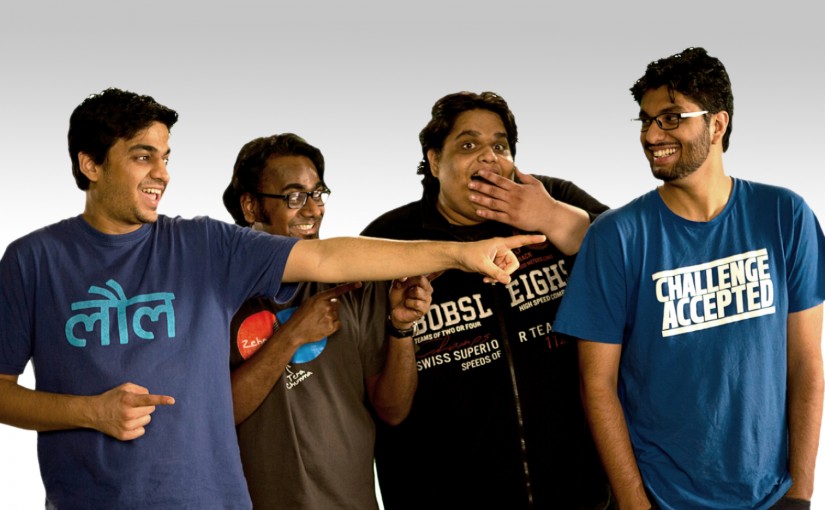Drop us a few lines about the task and we will get back immediately to see we how we can take the discussion forward. Alternately, just pick up the phone and speak with us at +91 9910034330 and we would be happy to help.
- - Do tell us a little about the nature of your business.
- - Be specific about what you’d like us to help you with.
- - Knowing your budget always helps us plan a suitable intervention.
- Blog
Blog the Talk 1- Impact of blogs and social media on business & marketing in India!
-
Blog the Talk 1- Impact of blogs and social media on business & marketing in India!

The launch of www.blogworks.in is a significant milestone in the ‘blogs for business’ journey that I embarked upon a couple of years ago – thanks to Prema,Kishore and Guru (who has also designed blogworks.in and this wonderful blog) – thanks all. I wanted the launch of BlogWorks™ to reflect the collaborative power that the Internet, and more significantly blogs – as the new flag-bearers of the Internet – empower us with. Blogworks™ – Blog the Talk discussion series was thus conceived and will feature the best of learning from the blogosphere and otherwise, through panel discussions, talks and one-on-ones – mostly conducted online.
Edition 1 discusses the Impact of blogging and social media on Indian business and marketing. It was remarkable that each participant, from the heavy-weight (figuratively speaking) panel, confirmed within an ‘Aye’, within hours of my writing to them. Thanks all. The entire discussion happened over an internet messenger – apt, wouldn’t you agree? – both, the message and the method. Our panelists -in no order of preference! :) –- Toby Bloomberg: “A real live blogger”, “Business blog evangelist” that’s what people have called Toby. Toby is president of a strategic and social media consultancy based in the U.S. She has been a real live blogger since the spring of 2004 when she launched Diva Marketing Blog. As one of the most recognised consultants in this space, Toby’s passion now is helping organizations navigate the blogosphere and developing social media/blog strategies that support their business goals. Toby is based out of Atlanta, USA
- Govindraj Ethiraj: Journalist-writer, a keen watcher of the social media and technology space, Govind is the New Media Editor for Business-Standard. A keen blogger, he writes a popular blog at Dateline Bombay. Govind is based out of Mumbai, INDIA
- Anurag Batra: A dear friend, Anurag is the Editor in Chief & Managing Director of the exchange4media Group – a special interest publishing company which publishes five titles including three titles in advertising, marketing and media domain- Exchange4Media.com , PITCH , Impact and two consumer titles Franchise Plus and Realty Plus . Anurag is based out of New Delhi, INDIA
- Yours truly moderated the discussion. I too am based out of New Delhi, INDIA.
Without any further ado, edition 1 of Blog the Talk. Cheers!
Rajesh :Toby, welcome, let me begin by asking you a general question. You have been offering advice to organizations in a relatively mature US market. What are the trends and impact of blogs on businesses based upon you have seen?
Toby: Good question.
i.Let’s take Impact first. The standard response to what is the impact of blog on business is, “It humanizes the organization.” I like to say, it pulls away the Wizard of Oz curtain and allows your customers, prospects and well the world at-large to see the real you … through the eyes of the people who work for the company.
Now that sometimes scares an organization down to its toes. However, like the Wizard in Oz who hid because he didn’t want the people to see that he was “just a man”. Once however, Dorothy and her pals met and got to know the real Wizard, they liked him- they were no longer afraid of him. The Wizard got to know them better too and was able to really understand their problems and offer solutions. That’s the long-range impact of business blogs: to help both sides, the company and the customer know each other better.
ii.In regard to trends – Companies who understand the benefits and ‘get’ that blogs/social media (podcasts, vlogs (video) and whatever the future holds) are credible, marketing/business strategies will begin to integrate them into their master marketing plans. Blogs will also become a standard part of most websites-rather like the ‘About’ page.
I also see more ‘mash-up’ niche communities being developed. It seems the more technology plays a role in our lives the more we want to connect with people. Communities that allow for profiles and thus deeper interaction with members are developed faster.
Ethics will continue to be a critical point in the discussions as new business models are developed around social media. For example, is pay of a post ethical if a blogger does not disclose or is not transparent about the activity? Last week a client asked me how to ‘buy links’ on high profiled blogs. Pay-per-post is the closest to ‘buying a link’, that I’ve seen thus far.
Companies will offer more than one kind of blog. Traditional blogs, Sponsored blogs and Topic blogs that are written by copywriters.
Rajesh:Could you elaborate what these terms mean?Toby:
i.Traditional Blog – The type of blogs that we’ve been talking about. Blogs written by a person within the organization to help bring a human side to life. People talking to people.
ii.Sponsored blogs – Blogs that are paid for by an organization but not written by the organization. Think of a football sponsorship – the logo is on the field for awareness, branding, etc. chances are although the company is paying, the company may or may not own the content.
Rajesh: Something like vespaway.com?
Toby:
iii.Topic blog – could be a subset of traditional or sponsored. However, I think of it as an online e-letter. The style is conversational but there is little insight into the organization. Topic blogs are often a safe way for an organisation to step a toe into social media
Rajesh : Could you give an example?
Toby: Wells Fargo bank began with a blog on earthquake history. It made sense since it was some anniversary of the SF earthquake and the bank is based in San Franciso. They recently launch a blog about student loans. About 4 employees are authoring that blog and providing different insights.
Rajesh: I wanted to ask you a few questions based on your reply to the first one. Would it not be a good beginning that the CEO starts writing a blog and then encourages employees to participate? We are yet to cross the bridge here in India, in terms of CEOs writing a blog themselves. What do you think?
Toby: Could be …
The CEO must first and foremost see the value in the initiative. Then if a company agrees blogs are credible marketing tools or strategies the first step is to analyze if blogs will help solve a business challenge or support a marketing goal. If the answer is yes, then as with any strategy, the next step is to set goals and objective. The exercise then becomes a cost-benefit analysis. Do the rewards justify the resource output?
Jonathan Schwartz, CEO of Sun Microsystems talks about his ability to reach millions of people with his blog, versus a few or even a few thousand giving a face-to-face speech. For Merrill Dubrow, a new CEO of a large U.S. based marketing research company – M/A/R/C – his blog is building his reputation as a thought leader in the industry while providing a way to help clients and prospective clients find out ‘what makes him tick’.
Anurag: Toby, It’s easy to start a blog difficult to maintain, are they really ghost written?
Toby: Good question!
Anurag: Also, culturally in India we are a face-to-face society meet, touch and feel – blogs cannot duplicate the chat over coffee.
Toby: Nope but they can begin and extend that relationship.
Anurag: How does one address the culture issue?
Rajesh : Also, Anurag, the CEO doesn’t always get the opportunity to meet everyone, blog promote the concept of mass intimacy.

Toby: Exactly!
Toby: For example, when you read a blogger over time you begin to “know that person”.
Anurag: Ok, I agree. However, that might be regarded as superficial in India.
Rajesh: Also, some people are difficult to reach – policy makers – blogs can help you to reach them, if you have a credible voice
Toby: When you do meet in person the relationship begins several levels above “who are you?”
Anurag: Sure
Toby: Ah, and there is a challenge – authenticity.
Anurag: Also organizations are not really democracies.
Rajesh: I agree with Anurag there.
Anurag: Blogs can being incoherence in the philosophy.
Anurag: There is a certain novelty value. Also, it’s a bit like camp fires, people gather around them.
Rajesh: True but that’s where a strategic approach to blogs is needed. What we have seen so far in India is tactical initiatives – “Let’s set up a blog,” kind of initiatives. No one has really paused to think, what is the need? Who will blog? Why and how will it contribute to the need?
Anurag: Agreed.
Toby: The U.S. also struggles with that- we are not so far away from your challenges.
Anurag: The question is if expert opinion becoming a plug? Nuisance value!
Toby: Rajesh, your questions are where we want corporations to go? To begin to think of blogs as credible marketing strategies!
Rajesh : I totally agree, and I am hoping to make that the way forward for brands & corporates’ here – if I can help it.
Govind: Toby, seems to me that the few corporate bloggers, who blog, do it because they have the natural tendency to communicate to a broader audience, feel comfortable about having a somewhat `personal’ chat with complete strangers and of course have some inclination to the technology/Internet aspect. So, blogs are only an enabling communication device for someone naturally inclined to communicate in this form.
Toby: Govind, I agree. If someone has a natural inclination to communicate blogs are simply an extension – technology is just means to an end.
Govind: I’ve interviewed Jonathan Schwartz, he is a cool sort of a guy and blogging seems to be a natural extension of his personality!
Toby: So the questions then become how else can blogs be used in a marketing plan? The best blogs are exactly that!
Rajesh : I have now come to see corporate blogs and marketing blogs or blogs for marketing as different tools for different needs, particularly when someone says blogs for marketing, I don’t even think we are saying “We need to set up a blog”. An example that I use often is that of Amazon’s affiliate programme. By becoming a part of the programme, any blogger can sell stuff from Amazon and earn a commission. What is relevant, however, is that Amazon now has potentially 55 million storefronts. (Not that everyone is lining-up to sell!)
Marketers could similarly line up outreach programmes for bloggers.
Toby, do you have a view?
Toby: There is so much that goes on with this funny little website anyway. Anyone can set up a blog, but it takes persistence, passion and community wrapped up in your strategy to turn on the potential of blogs as a marketing tool. And then the job’s just begun when you have created one, if you are a brand using a blog, you have to promote it to get people in, which leads to developing a marketing strategy.
Toby: Do you mean placing ads on blogs? Is that what you mean?
Rajesh : That, and many times bloggers do write about interesting initiatives from marketers: Launch of a new blog or contests etc.
Toby: the controversy is not the blog ads, those are transparent, but the pay for posts.

Rajesh : I agree, pay for posts would be controversial. However, I didn’t mean paid, but pure write-ups because a blogger wanted to write about something he found interesting.
Toby: Oh yes, that brings up the topic of blogger relations
Govind: if you have paid for articles in newspapers, why would, technically, be blogs far behind!
Rajesh : That’s a huge debate by itself, Govind.
Rajesh : Govind, as a keen watcher of the new media space, what are the key trends, in this space, that you see emerge among the corporates in India?
Govind: Yes, I think its early days. Companies are yet to really focus on the world beyond big media. They have issues they want to communicate about. They want to understand what sections of the populace feel about their products or services
Toby: From a business perspective it becomes a question of perceived value
Govind: However, am not sure they see the value of communicating via direct pipes to consumers/bloggers on the other end. Though it’s changing…
Rajesh : Why not?
Govind: I see a few companies and their communications teams trying to see whether anything is being said about their companies in the blogosphere- particularly if there is an incident or development of some sort.
Anurag: Yes, Govind is bang on!
Rajesh: Yes, I can see that happening but ONLY when something has happened, and that is a problem, I think. They aren’t starting early on.
Anurag: They have a reactive approach at best, no proactiveness.
Govind: The influence of mass media is still strong, people have yet to grasp the true benefits of the long tail and the need or the value of communicating to and with the people that really matter.
Govind: I am speaking like I am a full convert but I will be the first to admit I am not. I belong to a `mass media’ product and would still depend on this product to influence opinion and mobilise.
Rajesh : Anurag – what kind of advice and coaching do you think marketers need, to maximize their understanding of the space?
Anurag: Internet Marketing is young in India, but is catching up. Blogging is totally new – unchartered territory. Marketers and entrepreneurs have a long way to go on this and a lot of education would be needed – seminars, workshops et al, before they are totally comfortable.
Anurag had to leave the conversation at this point, for another engagement. The rest of us carried on…
Toby: There is a lot of talk here about consumers controlling the ‘message’’; that companies are not in control of it anymore, but can ‘manage’. Are you seeing that in India?
Rajesh : Toby, early days still, but the ‘individual’ is becoming more and more important…
Toby: Came across this post today…
It’s about two journalist leaving the Washington Post, to work with a start-up new media company -might be of interest http://farrellkramer.com/blog/category/media-trends/
Toby: Also a sign of trends in consumer online consumption of news. Where do the layed off reporters go??
Rajesh : Interesting.
Toby: I still like reading old-fashioned paper news but I must admit it’s easier to skim the WSJ online, than it is to sit down to read the Sunday Times.
Rajesh : Govind, I have another question for you. How do you think the media will consume and gather information going forward? What would be the role that blogs would play? I can see this change already happen. Your views…
Govind: I think media is learning to appreciate that there are more than one credible source of information and perspective. Earlier, what was credible was on print, TV or perhaps radio.
Today, you have to add the blog world as well. You have to accept that Professional Amateurs (Pro-Ams) can have powerful opinions and insights into issues and subjects which you can learn from and add to your own understanding of a subject.
Rajesh : So, are they ‘raw material’ or anywhere close to the finished product?
Govind: Some of the best debates on city conservation issues (Mumbai), have been on blogs here as because the people who are writing these blogs are technically competent people, who are putting their skills and training into analyzing real world problems. They do it for their own satisfaction, but the fact is that they inject useful knowledge and perspectives into the melting pot of information, ideas and thought.
All of which helps media, which is not often a specialist on most issues, as we all know.
Rajesh : So, you agree that ‘experts’ blogging will bring the necessary credibility to this hitherto considered ‘not so credible’ medium.
Govind: Both experts blogging as well as non-experts, depends what you are looking for -sometimes it’s only a point of view on an issue that has mass appeal.
Toby: Very interesting! Blogs began in the states with the geeks but if you don’t count the teen diaries, the next major area to embrace blogging was politics.
Rajesh : What about CEO blogs? And, how would the media reinvent itself, in times when business leaders can reach the stakeholders directly, with much more ease.
Govind: The problem in my mind is in sifting through, finding what you want or are looking for. It’s somewhere there, but where!?
Rajesh : Aggregators will have a key role to play. You have pointed out to a key question – how do I search a word, which I don’t know or something that doesn’t feature in most popular tags? Then I am limited to looking at what I already know or I just keep hunting.
Toby: It is a messy world.
Govind: Guess so, or you will eventually find what you are looking for. For instance, if I want truly insightful views on Bush’s handling of Iraq war, I am sure I can find it, just that I will have to search for it!
Toby: Brings us back to your credibility issue or in matter of opinion is that even important?
Govind: Toby, the point you made about politics is interesting. Who or which are the other adapters of this world?
Toby: From politics, the journalists picked up. As in India, businesses were the last to the table and most either don’t realize the game has changed – can’t figure it out or think if they ignore it – it will go away.
Rajesh : Maybe businesses are always looking for ‘returns’ and ‘critical-mass’.
Rajesh : This leads me to my next question for you, Toby.
CEOs are busy people and writing a blog means investing time. What is your advice to make it worthwhile for the organization whose CEO blogs? Should every company blog? What should be the approach?
Toby: Yes Rajesh, as we discussed earlier, it goes back to strategy and value.
About should every company blog? I ask 2 questions of companies:
i.Will blogs solve a business challenge or support a marketing goal/initiative?
ii.Will the company culture support this type of open communication?
If answers to both questions are, yes, then it’s time to explore blogs!
If even one is, no, the company is not ready and the blog initiative will fail.
Rajesh : True and both valid.
Toby, listed companies have guidelines to follow, any tips for CEOs to ensure that they don’t get into any issues around that with the regulator.
Toby: If a corporation takes the time to carefully craft guidelines for bloggers, the CEO should follow those as well. The CEO may sometimes have reasons to color outside of those lines but the reasons should be carefully considered. In addition to guidelines (what to write about, how often to post, linking strategies, etc.) companies should develop a code of ethics that addresses the issue of transparency. Of course ‘honesty’
should be at the heart of guidelines and code of ethics.
Rajesh : I believe, the same rules that an organization would follow for other outreach programmes, to adhere to the regulator’s guidelines, should guide its blog programme too.

Govind, blogs and social media give the consumer a voice. Similarly the activist groups on human rights, environment etc. – do you think the organizations are listening and acting? For example, your Mumbai blog?
Govind: Ye, some people are listening. I am still not sure whether I have achieved what I wanted to achieve. Okay, so 1,000 people who can do something have perhaps read my blog or similar blogs on similar topics, but will they do what I think they should? Or is a mass media attack better- where maybe 500 will be touched but they may act, or be influenced? These are questions, I have no answers for!!
Toby: The minds of the public and consumers! Guess it depends on the people who are the influencers and the issue.
Govind: Or the other way round, maybe 100 really interested people, capable of some follow up will read the blog, as opposed to a 100,000 who will read a newspaper or watch a TV show. Which one has more impact? I guess you’ve answered it somewhat!
Toby: The credibility would be a function of the credibility of the blogger/s and of the extent of buzz and impact. For example, if many bloggers posted on an issue and to the extent that mainstream media picked it up and the concern went from the blogosphere to ‘real world’ word of mouth buzz, I should think that would get the attention of any politician or government bureaucratic.
A few months ago I initiated a post that ended up changing the way a major company does business.
Jupiter Research is a well-known marketing research company based in NYC. They are known for conducting research and selling the results as a product to clients.
Jupiter issued a press release, through their PR agency, stating that by the end of 2006 most companies would be blogging! I thought that was a little odd- I’ve been speaking to marketers all over the US for the past 2 years and most of the people are just beginning to understand social media.
I sent the PR firm an email with my concerns about their statistics and asked for the methodology behind the question- that was all I wanted. Not the research; not the report.
The response from the agency was that Jupiter only released methodology to paying clients and not to competitors – that one gave me a chuckle.
Anyway, I sent back an email and told the agency that I was going to post, but would include my concerns. I never heard back and I posted. Within a very short time, my post was linked and the conversation extended on some very high traffic blogs in the PR blogosphere and in the healthcare community.
Fard Johnmar, Healthcare Vox blog actually bought the (I think) $750 report. He posted that the report wasn’t worth the paper it was written on and cautioned his readers not to buy it.
A blogger challenged me to contact Jupiter directly, which I did, and left a voice mail on what was, the President of Jupiter Kagan, David Schatsky’s, mail. I offered him an opportunity to tell Jupiter’s side of the story on Diva Marketing (my blog).
Keep in mind that Jupiter’s analysts have blogs, including this guy. However, no one was talking about this issue. He sent me an email and pretty much said that not revealing the methodology was a new business tactic; that I got my facts wrong and I owed my readers an apology.
With his permission, I posted the entire email. And as you might imagine, it sent off a flurry of new posts.
David Schatsky eventually posted on Jupiter Research’s blog that Jupiter would handle blogger relations differently and they would advise their PR agency to do the same. In addition, if people asked for methodology behind their studies, they would provide that information. The WSJ Online had reported on the story and they picked up a quote from my blog.
So, the lessons learned really are… that it was not one blogger (me), but a community of bloggers who influenced a major company to change its business practices. By the way, it is industry standard in the marketing research community to publish methodology when providing the public with results.
Rajesh : Wonderful effort.
Rajesh : Moving on…
Govind, are Indian brands & organisations ready for blogs?
Govind: Can you expand on that a little Rajesh?
Rajesh : That blogs can have an impact, CEOs can showcase thought leadership, reach policy makers and prospective employees – whom everyone wants to reach these days. Similarly, marketers can share there passion, gain feedback and comments and all that and yet India has been behind on using the tool!
Govind: Okay, are we ready? I don’t think so! Should we be ready? I think so!
I think we are in the relatively early stages of consumerism and consumption and everything that goes with it. Companies are yet to build strong customer relationships and connect, so the compulsion to go to the next level where there is closer more intimate engagement may not be there.
It’s also to do with how many internet users you have, around 38 million, how many of them are active consumers, the products and services that lend themselves to connecting etc.
If you were to take the example of a popular car like Tata Indica, I would argue that most of its owners will not know English, or even access the internet. I wouldn’t be surprised even if there are Mercedes owners who fit in the same category.
So you have the internet and all its potential on one side and your consumers on the other. Am not sure at how many points the two connect as of now?
Govind: Except of course for some demographics, like very urban, English speaking audiences etc.
Govind: I would guess most internet users are consumers of some sort…Rajesh?
Rajesh : Meanwhile, what I have been saying is… there will of course be reactive blogging by brands, companies and business leaders in response to being spoken about on the blogosphere, but I think marketers and corporates who adopt blogging proactively will benefit most.
Blogs are an opportunity for marketers to engage with the consumers first-hand, to establish context – by sharing and seeking perspective – in a two-way communication process that is closest to word-of-mouth and yet broad-based. Similarly, corporates can establish thought leadership, influence policy, engage with prospective employees and more through proactive blogging.
Rajesh : Toby, you and I are trying to say, need to build a strategic approach to blogging. Do share your take and experience on this subject.
Toby: I think blog strategy should be considered as any other marketing initiative. That means setting goals and objectives, and yes, measures of success. Blog success measures should tie back into the goals/objectives.
As with many other marketing strategies e.g., branding initiatives, there are soft and hard ‘success measures’.

Rajesh : What has been the response?
Toby: People are just beginning to understand that ROI can be measured – the first bloggers were dead against that; they felt that building relationships and showing the human side of an organization should be sufficient.
However, in order for corporations to accept social media as a credible marketing tool it must be held accountable for some sort of result.
Rajesh : Correct.
Govind: Yes Toby, I think as a journalist it’s difficult to relate to the application of ROI, but I guess from a corporation’s point of view that is the way to go!
Rajesh: I believe that is not just relationships etc., but jump in search ratings; tone of voice in comments & feedback; inclusion in blogrolls and of course response in mainstream media than can showcase Impact.
Rajesh :Govind, as a journalist, and writer, what is the value/ information you seek from a business blog?
Govind: I have no Indian examples to go by, but if I look at blogs in companies like General Motors, Sun or even Google, I guess it gives me valuable insights into the process of innovation; it gives me insights into what’s cooking next and also, some insights into the people behind the products and services. Understanding what people are thinking is also critical, because that is a pointer, not just to what is going on within the company but also their understanding of and response to external developments and the environment.
It’s also interesting to read what people are saying to these companies, their reactions, questions and posers. They could be consumers all over the world or journalists like me, or people belonging to other walks of life, maybe even policy makers.
Rajesh : Sure, but are companies listening to the voice of the consumer?
Govind: In some ways, yes, because theoretically their existence should depend on that! But are they doing it by tracking the world of blogs? Not really! Not yet, at least. That ties in with the larger point on internet adoption by active consumers of products and services that corporations are selling.
Rajesh: True, I expect that to change, however, as critical mass has started to build – marketers and corporates look at that.
Govind: One more point. I think many Indian companies have barely reached or graduated beyond setting up an effective website as a tool to reach out to consumers and blogs come much later.
Take away automobiles, financial services, hospitality and a few others, most other companies and industries are barely connecting with their consumers, or interacting.
Rajesh: But, we may jump technologies, like we did with pagers and blogs are more ‘need based’.
Rajesh: In ways true, but again it could link with the numbers so far…
Govind: I do hope that companies and their executives communicate and interact with the world at large- very simply put.
Toby: Govind, I really like your statement.
Govind: They have to do more of that, in general, and then on blogs! Companies have to define their very existence as based on the consumer, not sure too many Indian companies practice it, of course everyone says it…
Rajesh: Agreed. They say, loyal customer, I think the company needs to be loyal and not the customer.
Toby: Love that one too Rajesh.
Toby: It’s a very different mind-set but one that will provide critical in a globally competitive world.
Govind: Agree. I think some companies in some industries are beginning to explore the digital world, so to speak, often led by digitally inclined CEOs – that’s where it starts. So it’s a two way process. Am only seeing small strains on both sides.
I maybe wrong about this but I do get the sense that Gang of Girls and Being Girl are not really CEO initiatives but marketing department led, which is fine but on a larger plane it shows that the space that we are talking about has not been fully embraced.
Rajesh: True, I don’t think we have seen any true corporate blogs, except Infosys and maybe a couple of others.
Govind, residents of communities like Second Life are reacting sharply to blatant commercial usage – are marketers going overboard? Also, how relevant are communities like Orkut for a marketer?
Govind: I am familiar with Second Life as a concept and have visited the site and read about it, but am not familiar with the issue.
Govind: You talk about communities. I think they are relevant to marketers, undoubtedly, it’s just that much of this is nascent in the Indian context. You forwarded the P&G shampoo link, I think. There is Unilever’s Gang of Girls – so there is an attempt to create a community itself as opposed to reaching out to one. I don’t know whether that suggests absence of communities which are specific or relevant to certain products or services or the inability of the marketeers to reach out.
Rajesh : That’s true and more & more marketers will, and should, try and congregate at communities that are more defined than a larger environment, which is anyway difficult to monitor.
Toby: There are companies in the States, and even a marketing research firm in France that are exploring 2nd life. What is interesting to me is this is b2b and not b2c Reperes Second Life .
Toby: I believe that ‘community’ is the trend in social media. Second Life gives people the illusion to merge online with quasi reality. It seems to me that the more technology integrates into our lives the more we yearn for more people contact. Second Life is one way to bridge the gap…
Rajesh : But is there a fear of it becoming too commercialized? It’s like selling ads and no programme, no one wants to see just ads!
Toby: If there is too much commercialism people will not log on. They will find a balance.
Rajesh: Absolutely!
Govind: It’s interesting what Toby is saying. Just that from an Indian point of view, it’s early days still, though I am sure we will reach there sooner, not later, as some of us already have.
Rajesh : Toby, search is contributing a significant amount to Internet traffic and marketers are looking at SEO and SEM like never before. How can blogs help in optimizing search presence for marketers? I think search ratings should be a good reason for people to start blogging…
Toby: Yes, and for many companies that is part of the ROI. Blogs and search engine ranks go together like p&j (peanut butter and jelly).
Those little spiders love fresh content, html and inbound links. Those are elements that make for a successful blog. Diva Marketing Blog is the poster child of SEO via blogs. Type marketing blog in google and my little blog pulls up #2 – sometimes #1. There are usually over 2million hits on that search and several google sense ads. My ranking is all from organic search techniques.
Toby:The relevancy for me is that is what I do – marketing blogs- so as a business development strategy it can’t get much better.
Rajesh : Amazing! You need to teach us, a few, if not all those tricks?.
Toby, to conclude, what are the take-aways that you would like to share with us?
Toby: A couple of points that we should keep in mind:
No matter who writes a company blog, the CEO or an administrative assistant the Blog Mantra should be kept top of mind: Honesty, Transparency, Authenticity and throw in a little passion.
Business blogs are a long-term strategy so passion about the topic is important; as is good writing skills.
Blogs are not written by internal departments crafting messages; they are authored by the people within those departments who are sharing their passions with people who are interested in similar issues and concerns.
Blogs provide a unique vehicle to engage customers if the blogger remembers to: listen, learn and then interact.
Rajesh : At that note of learning, let me once again say thanks to all of you, for joining in and making this such an insightful discussion. I am sure, this is the just the beginning of many such conversations we will engage in, soon. See you all.
Dear Readers, do participate and carry this conversation forward, write in with your feedback and comments. Tell us if blogs work!
Blog the Talk- Edition 1 is supported by:



Disclaimer: Views of authors are personal and do not represent the views of Blogworks, or any of its clients.
-
Contact
conversations@blogworks.in
+91-9910034330 -
Newsletter
-
Social

























